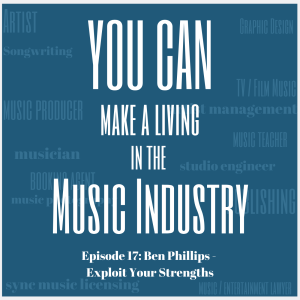

22.7K
Downloads
78
Episodes
Did you know that YOU CAN make a living in the music industry? Celebrities, working class musicians and people just like you who work behind the scenes in all areas of the music business will share their stories, encourage you and give you tools and how-to examples of the ways YOU CAN make a living doing what you love in the music industry.
Episodes

Monday Feb 24, 2020
Episode 17: Ben Phillips - Exploit Your Strengths
Monday Feb 24, 2020
Monday Feb 24, 2020

This week I'm talking with my friend Ben Phillips who has done pretty much everything there is to do in the music industry. We are discussing road vs session drumming, relationships, producing, mixing, editing, demos vs. master recordings and how exploiting your strengths can give you an advantage at making a living in the music industry.
Show Notes:
Sponsors: Edenbrooke Productions - We offer consulting services and are offering listeners a 1-hour introductory special. To request more info on consulting services, email Marty at contact@johnmartinkeith.com.
Talking Points:
*Started playing drums at nine years old.
*Found ways to be around music anyway I could growing up.
*Went to Belmont University and studied studio engineering.
*I changed to session drumming as my focus.
*I would take any gig learning to play in all situations.
*Right out of college I had my first road gig with a signed artist from an audition.
*It was a stepping stone for me getting that experience.
*That led to a gig with a signed country artist because of relationship I had with a friend of mine who worked for the producer Dan Huff told him to put an band together for the tour and he called and asked if I was interested.
*It took 4 or 5 years of being in town and building relationships before I got that opportunity.
*The friendship I had with a bass player in college led to most of my gigs in the early days.
*New drummers wanting to do studio work should work on listening to everybody else, really listening to the vocal and going back and listening to how what you play affects the other parts.
*It’s good to understand production and know that there is going to be more stuff added later.
*You’re there to serve the producer and the artist, not yourself.
*Some people I have drummed for on records are Matthew West, Rush of Fools, Steven Curtis Chapman, Michael W. Smith, Blake Shelton, Chase Rice, Chris Jansen and more.
*When I was tracking drums in sessions I got be around a lot of great studio engineers and I got to ask them questions and learn a lot that way.
*I went through a period where it was hard to find good paying gigs and I quit for about 2 years.
*I moved away from Nashville and when I came back I decided to put a studio in my house, so I started reconnecting with and building relationships with friends from Belmont while meeting new people.
*It was slow for a few months while trying to reconnect and get work.
*I got a call from a college friend who needed me to play drums on session for CCM producer Pete Kipley at a studio on Music Row.
*Pete had a friend producing a song for Rebecca St. James for the Narnia soundtrack and asked if I would play drums on that.
*That led to a lot of work on different projects which set me on the path I’m on now.
*All of these relationships led from one thing to a bunch of things.
*I never know where the next lead or next step is going to come from.
*When it came to getting good drum sounds, I didn’t like how others were doing it so I learned to do it myself.
*I was one of the first people in Nashville to have a home studio before it became the norm.
*I got married so I moved the studio to another house in a different part of town.
*Because of another relationship I met a guitar player named Ilya Toshinskiy and he got me a lot of work doing country demos at my studio.
*Country writers were coming in all the time so I got to do a lot of work tracking and mixing for Shane MacAnally from the show Songland, Old Dominion, Sam Hunt, Kacey Musgraves and more before their careers took off.
*When you’re mixing a song with a writer there, you get more time to sit and talk with them and build relationships with them.
*A “demo” is a demonstration recording to show the label or manager how the song could go.
*Chris Jansen’s radio single “Buy Me Boat” is the demo that I recorded and mixed.
*A country or CCM demo average cost is $800 - 1000 for a full demo per song.
*A major label Country album recording can cost $20,000 per song on average.
*A Contemporary Christian Music label song is on average $2,000-4,000 per song.
*I can do a demo in about 4-5 hours per song, which is very fast.
*Musicians make about $60 an hour and usually do 3 songs in 3 hours at a time for $180 to record a demo if you’re with the Musician’s Union.
*On a master scale recording that ends up on an album the musician will make up to $750 for 3 hours an average.
*On a demo you only get paid for the work recording the demo.
*Recording on a album cut you can get royalties on the back end as well.
*A studio can be $2000 per day.
*If there is a bigger budget, everything is going to cost more just because you can charge it.
*They only charge $1000 per demo because they have to pay for multiple demos to then choose which songs to use on the album and re record those demos, so the demo budget per song is lower.
*Engineers and mixers only get paid for the initial work on the song, no back end royalties, so they charge more up front.
*A friend asked if he could do some guitar overdubs at my studio with producer Scott Hendricks and we hit it off and that got me working with him doing editing for major albums like Blake Shelton and more.
*Editing is cleaning up the recordings and making sure that everything is lined up and any pops and clicks, etc. are gone.
*Slow down and listen.
*I’m still striving for the next thing, still pushing for how to improve and get better, how to get to the next level.
*There is no finish line.
*I’m still learning how to play the game.
*What is the game? Music business, politics and relationships.
*What I want to put out in the music business is my reputation, cause if I don’t have a good reputation, I don’t have anything.
*I sold my studio and started renting space at Sea Gayle Publishing to focus on mixing and to be able to go to other studios to work.
*I had to change people’s perspective of being the guy drummed and could mix to being the mixer or the producer, so I sold my studio.
*There’s really no difference between and demo and a master recording. It just depends on if the demo gets placed on album or not. It still needs to be done at the highest level possible.
“Phase” is timing so when you put a plugin on something and there’s delay compensation and it’s not compensated correctly, it’s going to be out of phase from what you originally tracked it from depending on what plugin you put on it.
“Phase” is not a technical decision, it’s a creative decision.
*I can do a complete demo of a song from start to finish in 5-6 hours.
*A lot of people will send me a demo they had done somewhere else and ask me to fix it and make it better using the existing tracks.
*Production is managing expectations.
*Exploit your strengths.
*Go to where they’re making music you want to be a part of.
*The studio world and the live world do not generally mingle in Nashville.
*If you don’t want to play live, don’t start.
*It’s a paradox because when you start out you have to take any gig that will come along and a lot of times that’s a road gig.
*I didn’t really start working until I realized this is a business first.
*I am in the service industry of giving my clients what they want.
*Have integrity and be fair to everybody and have a good attitude.
*Marriage relationships are more important they your musical job so make decisions based on that.
*There are 100x more people making a living in the music business that are not famous than those that are famous.
*You never know what an opportunity will lead to, so say yes when you can.
*Work begets work.
*Make a decision and if doesn’t work, make a different decision.
*Most people want me to send an mp3 attachment, not a link.
*Give the client what they want.
*Send links that do not expire.
Ben Phillips started playing drums at the age of 9 in Atlanta, Ga. At age 14 he began engineering at his church and school. He continued this tag team with different bands until he got to college at Belmont University in Nashville, Tn. There he started focusing on recording and playing in the studio. When he graduated in 1997 he began touring with signed country artist SheDaisy, and a variety of local bands, while also recording with various christian and independent artists.
In 2005 he started a studio in house and later moved to a dedicated studio spot in Berry Hill, Tn. He would play drums, record, mix, engineer and produce for a variety of artists. Some of the artists he’s worked with include: Blake Shelton, Chris Janson, Brett Eldridge, Building 429, Francesca Battistelli, Big Daddy Weave, Dustin Lynch, Steven Curtis Chapman and Old Dominion as well as songs for the tv show Nashville. In 2019 he sold the studio to concentrate on mixing and producing and now has a mix room off of Music Row in Nashville.
No comments yet. Be the first to say something!